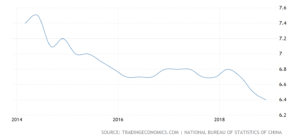Growth is relative.
In the U.S., we thought it was good news when the economy started growing again at a rate of 3+%. During the Obama Administration, when the economy was growing about 2% a year, pundits were saying that 3% growth couldn’t be achieved.
In contrast, China’s economy is growing at a rate of 6.4%. And that’s bad news.
China’s economy is growing twice as fast as ours – and yet people are worried, because it’s experiencing its weakest growth in 28 years. The last time China’s economy grew this slowly was before the Internet, the Cloud and smartphones.
So why is 3% growth good in the U.S. and 6.4% growth bad in China? China’s economy has been growing rapidly for decades, because the country has a great deal of catching up to do as it completes its transition into a developed country; that is, if you consider a country as repressive as China to be a developed country.
Another reason China’s economy has been growing rapidly is that it cheats. Reducing or ideally halting the country’s ongoing theft of intellectual property is a major negotiating point in ongoing trade talks.
In addition, it’s believed that the Chinese government inflates its statistical data to create the appearance of faster growth than that country is experiencing. One study found that China has been exaggerating its economic growth by about 2% for nearly a decade, which would bring current growth to 4.4%.
Even though the Chinese government has its thumb on the growth scale, growth in China has been slowing since 2014, when China’s economy grew by 7.5%.
Tariffs and sanctions imposed on China by President Trump are one reason for China’s economic slowdown, just as tariffs are playing a role in the U.S. slowdown. An interest in reducing or eliminating the tariffs is one reason why the Chinese government is showing some flexibility in negotiating a trade deal.
Unfortunately, a slowdown in the economy of the world’s largest consumer population (1.4 billion people) benefits no one. Chinese consumers will be less likely to afford American goods and when U.S. manufacturers sell fewer goods, the economy slows down.
Markets received a boost in late March, as U.S. and Chinese officials reported progress at the conclusion of their latest round of trade talks.
“U.S. officials said China had made proposals on a number of issues — including forced technology transfers — that go further than previous commitments,” according to CNBC.
A trade agreement that results in fairer trade would provide a boost not only to the economies of the U.S. and China, but to economies throughout the world.
